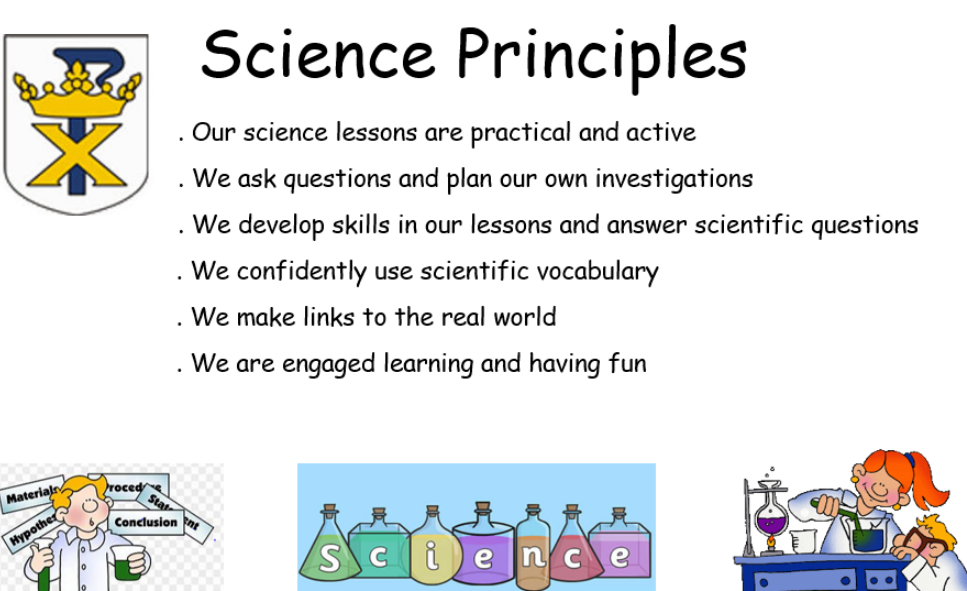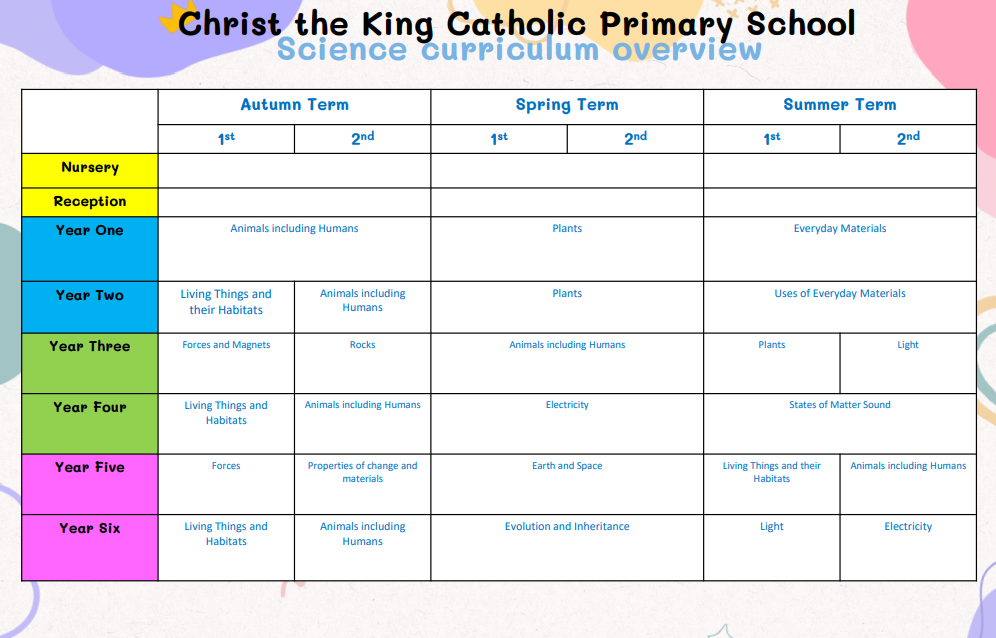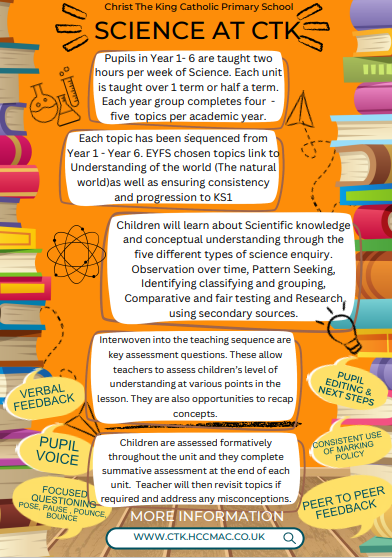
Intent, Implementation & impact
|
CHRIST THE KING CATHOLIC PRIMARY SCHOOL |
|
Learning, Growing, Praying together with Christ our King |
|
|
|
Intent |
|
|
What are the aims of this subject? |
What are the broad areas of knowledge and skills being developed in this subject? |
|
At Christ the King it is our aim that all children finish primary school with skills, knowledge and understanding through our encouragement for them to have a sense of awe and wonder about the world around them and our celebration of their inquisitive minds.
Through a wide range of purposeful, planned and structured learning opportunities from the moment children enter our school, they will acquire specific skills and subject knowledge to gain an understanding of scientific processes and an understanding of the purpose and implications of biology, chemistry and physics in every aspect of their daily life, stages of education and future life experiences.
|
Children will learn about scientific knowledge and conceptual understanding through the five different types of scientific enquiry: • Observation over time • Pattern seeking • Identifying, classifying and grouping • Comparative and fair testing • Research using secondary sources
|
|
Implementation |
|
|
How is this subject delivered/taught to students? |
How is formative and summative assessment used in this subject to improve student’s skills and knowledge? |
|
The progression of skills for working scientifically are developed through the year groups and scientific enquiry skills are of key importance within lessons. The progression of these skills is set out in the Science Progression Map. Each lesson has a clear focus. Scientific knowledge and enquiry skills are developed with increasing depth and challenge as children move through the year groups. They complete investigations and hands-on activities while gaining the scientific knowledge for each unit. In Key Stage 1 and 2, children use planning houses in planning investigations to ensure that they are developing their working scientific skills. In EYFS, children have the opportunities to explore, investigate and learn about different processes e.g. growth. through stories, investigation areas and questioning. Children have opportunities to discuss and record their findings to show their knowledge. |
Interwoven into the teaching sequence are key assessment questions, identified in green on lesson plans. These allow teachers to assess children's levels of understanding at various points in the lesson. They also enable opportunities to recap concepts where necessary. The sequence of lessons helps to embed scientific knowledge and skills, with each lesson building on previous learning. There is also the opportunity to regularly review and evaluate children's understanding. Activities are effectively differentiated so that all children have an appropriate level of support and challenge. Summative testing is used at the end of each unit in Key Stage 1 and 2. Teachers can then revisit topics if required and address misconceptions.
|
|
How is enrichment (e.g. Enrichment sessions, trips, residential visits, clubs) implemented to enhance the components of this subject? |
How are spiritual, moral, social and cultural values developed in this subject?
|
|
Children are offered a wide range of extra-curricular activities, visits, trips and visitors to complement and broaden the science curriculum. These are purposeful and link with the knowledge being taught in class. Regular events, such as Science Week or project days, such as Space Day, allow all pupils to come off-timetable, to provide broader provision and the acquisition and application of knowledge and skills.
Plants and Living things and their habitats are enriched by the students experiences in Forest schools and gardening Animals including humans is enriched by the students’ experiences in PE, visits by zoolab and educational visits to the zoo Light is enriched by the students’ experiences in the Sensory room and investigating with torches Forces is enriched by the students experimenting with cars on different surfaces and during PE lessons Sound is enriched by the students’ experiences in Music and performing arts Electricity is enriched by the students’ experiences in the cooking room and use of high-quality resources Earth and Space is enriched by the students’ experiences from visits to the National Space academy and a planetarium in school Everyday materials are enriched by the students experiences in Art and Design lessons Seasonal changes are enriched by the students experiences of seasonal walks and in forest school |
Spiritual: wondering about what is special in life and the interdependence of all living things and materials on the Earth. Wonder at the vastness of space and the beauty of natural objects.
Moral: Children are taught to show respect to themselves and others. We encourage children to use their knowledge of the world in a positive manner. We support our SEND children by pre-teaching subject specific vocabulary and adapting work where appropriate.
Social: group and practical work develops an open mindedness to the suggestions of others and teamwork skills. Children are encouraged to live out our Gospel values and develop a growth mindset.
Cultural: scientific discoveries are celebrated as part of our culture. Pupils develop an understanding and respect for cultural diversity and scientific discoveries by a wide range of scientists in many different cultures. |
|
Impact - Top Five to achieve |
|
|
1 |
Children our benefitting from lessons which underpin our Science Principles. |
|
2 |
Pupil Voice shows that they enjoy Science, and this is evident in their high levels of engagement in the classroom. |
|
3 |
Staff are more confident in their own subject knowledge due to high-quality CPD available. |
|
4 |
The profile of Science is raised due to fun learning opportunities during Science Week. |
|
5 |
We have recently been awarded the Primary Science Quality Mark (PSQM) this demonstrates our commitment to embedding Science across the curriculum. |
Overview of Curriculum
Science at CTK
National Curriculum
|
EYFS National Expectations |
|
THE NATURAL WORLD Children know about similarities and differences in relation to places, objects, materials and living things. They talk about the features of their own immediate environment and how environments might vary from one another. Explore the natural world around them making observational drawings of animals and plants. Know some similarities and differences between the natural world and contrasting environments, drawing upon their own experiences and what they read in class. Understand some important processes and changes in the natural world around them, including the seasons and changing states of matter. |
|
National Expectations |
|
The 2014 National Curriculum for Science aims to ensure that all children:
|
Top Science Websites For Kids
An exciting way of introducing science to kids is through science websites for kids. Here are some free science websites for kids that will help your child learn science.
1. Smithsonians National Air & Space Museum
Smithsonian museum is a magical place for a child. Apart from in-person visits, you can learn a lot on its website online, such as exploring astronomy, learning about amazing historical discoveries and current research.
2. BrainPOP -
It is one of the best free science websites for kids that offers educational videos and lessons with animation covering several science-related topics. Every topic comes with associated activities, illustrative videos, and quizzes.
3. My First Garden
It is a fantastic science website for kids that teach them what they can plant and educate them about conditions required to grow plants they choose. From planting a seed to planning a garden, this science website for kids covers it all.
4. Earthquakes for Kids
The USGS provides an excellent resource on earthquake education in the form of pictures, facts, puzzles, and games. Your kid can even ask a question to a geologist for clarification on any topic.
5. National Geographic Kids
This Nat Geo science website for kids enables them to discover more about the world with the help of games, apps, videos, and other such materials.
6. Discovery Mind Blown
It is another one of the top free science websites for kids and is an excellent source of educational content in the form of videos on different science topics. The site provides interactive games for kids, and you will find everything from the solar system to cool science experiments here.
7. Climate Kids
This is another website of NASA that focuses on the climate of the Earth and the impact of global change. Kids can learn about the earths climate with the help of games, activities, informative videos, and more.
8. Science Kids
As the name depicts, this science website for kids features a treasure cave of science-related educational material in the form of online games, lesson plans, free activities, experiments, and much more.
9. Kids Discover Online
This one is not one of the free science websites for kids but an excellent lesson plan site. This is a library of science along with social studies articles that focus on differentiation by reading level, allowing you to use the articles for different ages and skill levels.
10. Frontiers for Young Minds
This website has intriguing science articles and age-appropriate content, which makes it an engaging and excellent resource. The helping images make the content even more interesting.
Now, allowing your kids to improve their science knowledge with science websites for kids also means allowing them to use different devices with the internet. Thus, you must use a parental control app to ensure the appropriate use of the internet for which you can use FamiSafe.



